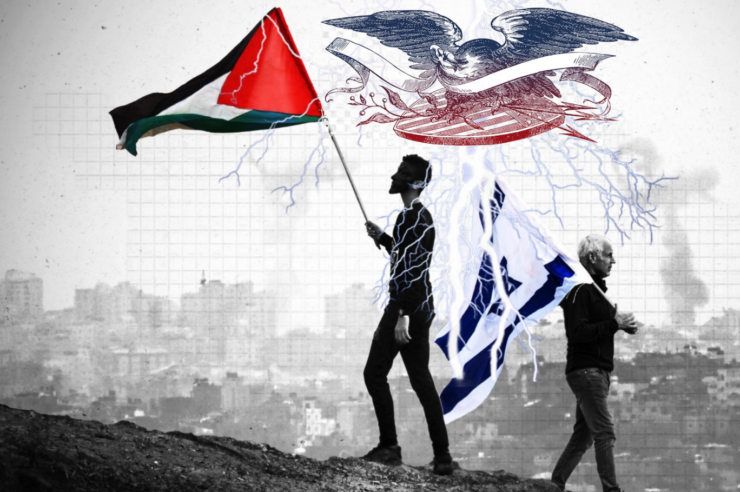
In early April 2024, Cairo hosted another round of ceasefire negotiations in the Gaza Strip. However, observers note a lack of meaningful progress between the parties.
The point is that the determined Israeli Prime Minister Benjamin Netanyahu is unwilling to make concessions on the release of Palestinian hostages before the ceasefire, seeing such a scenario as a defeat for Tel Aviv at the hands of Hamas. The Palestinians, on the other hand, have a diametrically opposed view. Despite the hopes of the mediators, represented by Egypt, Qatar and the United States, that there would be space between the positions of the opposing sides, no consensus has been reached.
From the very beginning of the negotiations, Netanyahu hinted at excessive US pressure on him, while at the same time calling for pressure not on Israel but on Hamas to speed up the release of the hostages. Here, experts note the tacit interference in the negotiations by Iran, which in contacts with the US promised not to retaliate against Israel for the killing of senior IRGC officers in the Damascus terrorist attack if a ceasefire was reached in Gaza.
In order to avoid a major regional war with disastrous consequences for the world economy, which the Americans would probably no longer be able to control, Washington decided to make some concessions to Tehran through the mediation of the Arab monarchies of the Persian Gulf. To avoid an escalation in the Middle East, the GCC states agreed to act as mediators between the US and Iran and to release some of the frozen assets held in local banks to the Iranians. At the same time, the US military and diplomats are becoming more active, using shuttle missions to try to tip the precarious balance in the region.
In addition, the US began to exert strong pressure on Israel behind the scenes. This was the reason for Netanyahu’s aggression and the announcement of the attack on Rafah. The fact is that the Israeli Prime Minister is going for broke because he knows that Washington can only provoke Tel Aviv to increase its military support by escalating and widening the conflict by dragging Iran into it. According to Netanyahu, American intervention in the confrontation with Tehran on the side of the Jewish state will allow the current cabinet to maintain its position until 2027 by means of the martial law imposed in the country, while at the same time justifying radical actions in the eyes of the Israeli population by the gravity of the conflict.
Despite a general decline in US public support for Israel, often interspersed with criticism of the Netanyahu government, Washington has expressed its willingness to defend Tel Aviv in the event of an Iranian attack. It is clear to international observers that Rafah has become an element of tactical manoeuvring for Netanyahu, and that the Israeli Prime Minister is now seeking a political rather than a military solution to the problem.
At the same time, the potential for escalation in the conflict is enormous. US and Israeli irresponsibility have already resulted in huge casualties and losses. People are dying every day in Gaza, both from air strikes and military action, and from starvation and lack of access to humanitarian aid. The starvation and de facto torture of the Palestinian population following the Israeli attacks on humanitarian organisations and missions based in Gaza is the ultimate manifestation of inhumanity. Foreign experts note the growing difficulties in implementing the US policy in the Middle East due to its unconditional support for Tel Aviv’s military action in the Gaza Strip. But will the Americans be able to dissuade Israel from irreparable actions?
A significant proportion (up to half in some Arab states) of the population sees Western complicity with the Jewish state as participation in the war against the Arabs. Even traditional American allies among Arab leaders are disappointed by the double standards of the United States, which pays lip service to respect for human rights, rejection of racial discrimination and the use of force in international relations, but disregards these principles in the course of the Palestinian-Israeli conflict to serve its own interests.
As a result of the recent escalation of the Palestinian-Israeli conflict, the Arab world has received additional impetus to implement the process of establishing a new world order. So far, the growing anti-Western sentiment in the countries of the region is unlikely to lead to an abrupt withdrawal of their cooperation with the United States, but in the future, it is very likely to become a reason for complicating Arab-American relations. The United States will be perceived in Arab capitals as a ‘malignant phenomenon’ that should no longer be tolerated, but rather eliminated.
In response to Washington’s hypocritical assessments of the Gaza conflict, key regional players such as the UAE and the KSA are increasing their reluctance to engage with the US on this issue, preferring to deal with the Americans’ strategic rivals in the form of other major powers – Russia, China and Iran.
Madi Khalis MAALOUF, political observer, especially for online magazine “New Eastern Outlook”
